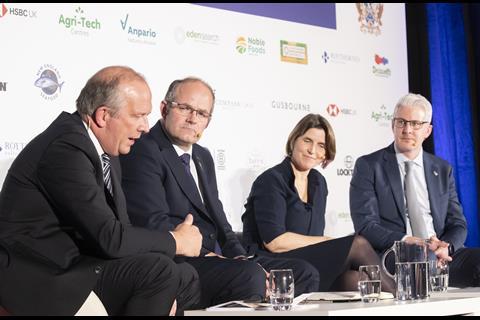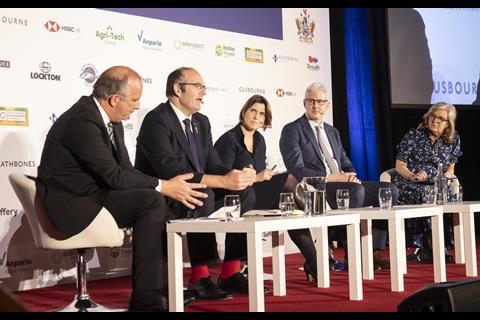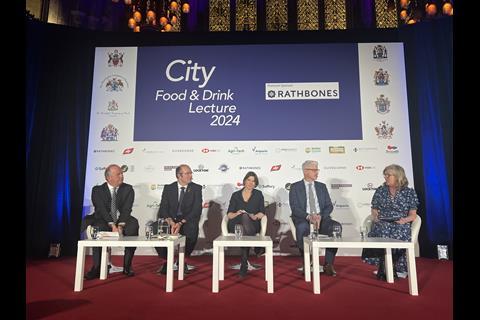Lively debate at City Food & Drink Lecture focuses on food policy, retail supply relationships, trade deals, and tackling the health crisis
Unsustainable returns to producers and trade deals that undermine British farming standards came in for criticism in an engaging panel discussion at the City Food & Drink Lecture on 11 March.
Sainsbury’s CEO Simon Roberts, who delivered this year’s lecture, was joined on the subsequent panel by NFU president Tom Bradshaw, the Food Foundation’s executive director Anna Taylor, and Dan Aherne, global CEO of New England Seafood International.
Observer food critic Jay Rayner kicked off the discussion with a pointed question to Roberts about how supermarkets have failed to pay the cost of production in a number of agricultural sectors, thereby undermining the UK’s self-sufficiency in food.
He pointed out that just 12 companies control roughly 90-95 per cent of food retail in the UK. On X he highlighted the consequences for producers of supermarkets protecting consumers from inflation but continuing to make huge profits.
“Is the market something that can be dealt with, or is the fact that you have to reward your shareholders a fact of life, and that’s just the way it works? Rayner asked.
Supply relationships
Roberts responded that Sainsbury’s has recently changed the way it works and has “done as much as it can” to make sure it reflects producers’ current input prices.
Retailers need to commit to more British production and sourcing, and work in a much clearer, longer-term way, he said. “Short-term trading arrangements aren’t the solution.”
Bradshaw responded that it had been so difficult for producers to pass on the inflationary pressures they have faced in the last two years that investing for the future has become impossible for many.
“Long-term thinking is really good, but short-term profitability gets us to the long term,” he reminded the audience. ”That is something that we can never forget when we’re thinking about agriculture.”
He also chimed in with a tongue-in-cheek (but perhaps telling) comment that UK farmers are “very cross with retailers because these retailers make extortionate profits and completely undermine our industry”.
Valuing food production
The NFU president added that the importance of food production had been undervalued and underappreciated by policymakers. He warned against prioritising environmental protection over food production.
“We need to put food on the same footing as environmental protection. The two really do go hand in hand and there can’t be a poor relation.”
Generally, the NFU president saw a “huge level of commonality” between the NFU’s vision for the UK food industry and the lecture delivered by Roberts before the panel debate.
Nevertheless, he reminded Roberts that “saying food production is now a priority is the easy part; delivering the policy solutions that underpin that is far more challenging.”
Bradshaw stressed that developing well-coordinated and “grown up” food legislation across government is “essential”, so that policymakers can be held to account.
But he reminded the audience that “ideology drives everything” in government. And until recently food production simply hasn’t been on the agenda.
Independent committee
The panel agreed with a suggestion from the floor that an independent committee on UK food security should be set up “rather than relying on the political whims of the day”. This could be similar to the government’s Committee on Climate Change.
“Setting out goals for the food system and being clear about how we will measure our progress over the coming decades – and holding the government to account for reporting on that progress – would be fantastic,” said Taylor.
Trade deals
One area of current government policy that the NFU is strongly opposed to is trade standards. The NFU continues to call for a level playing field for British producers when it comes to production and quality standards.
Bradshaw stressed that recent trade deals, for example the FTAs with Australia and New Zealand, have undermined UK producers and were “not acceptable”.
“While we can import food that is produced to cheaper systems of production than we can utilise here, retailers and others will always have an opportunity to undermine British production,” he said.
“All we want is a level playing field. All the NFU’s ever asked for is fair trade, not free trade.”
Tackling obesity
Another big topic of conversation was the opportunity for the food industry to help solve the UK’s obesity crisis, rather than contributing to it.
Bradshaw pointed out that obesity is costing society £100 billion a year, while Taylor said many people’s diets are damaging their long-term health and significantly increasing the number of economically inactive people Britain.
When it comes to improving the nation’s health, Taylor emphasised the importance of engaging citizens in food policy development in a more meaningful way.
She said it was important “not to isolate the policy conversation” when developing food legislation.
“We’ve had all this argument in the pollical elite about nanny statism,” she said. “But when you take that conversation to citizens, they don’t see it in those terms at all.
“They see the role of government as enabling them to live healthy lives and intervening in ways that support them to do that and look after their kids properly.
“We’ve isolated the policy conversation into such tiny niche that it’s become very disconnected from what citizens think.”







